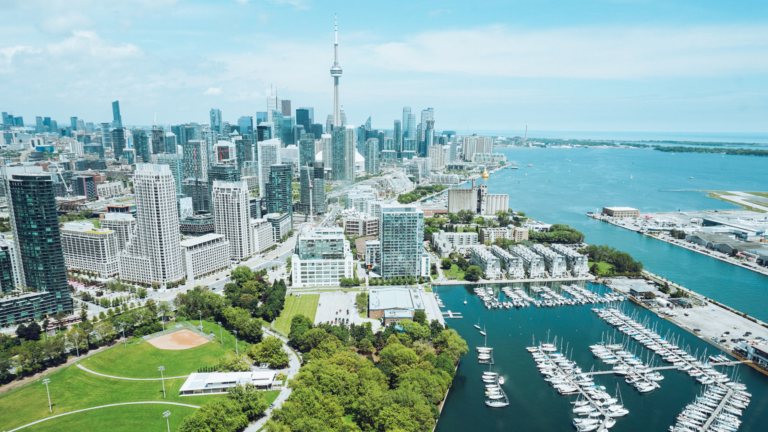There’s something magnetic about Toronto. A skyline studded with gleaming towers, tree-lined neighborhoods humming with life, and a cultural mosaic that makes every corner of the city feel vibrant—it’s no wonder people from across Canada and around the world dream of owning a piece of it. In this article, we’ll explore the latest March 2025 data, focusing on the average house price in Toronto, Ontario, and what it means for buyers, sellers, and investors.
You might be drawn to the buzz of downtown living, or feel more in tune with suburban life, and there’s also a chance that you’re looking into long-term investments. Either way, Toronto provides unique opportunities for real estate. But with shifting prices, fluctuating demand, and ever-changing mortgage rates, navigating this market requires more than just enthusiasm. It takes insight. That’s where reports like the Toronto Regional Real Estate Board (TRREB) Market Watch come in.
These snapshots of market trends, analyzed by brokers and economists, help decode where the market is heading—and how buyers and sellers can make smart moves. Read on to understand where the opportunities lie.
The Big Picture: Toronto’s Cooling Market
The numbers show a cooling market, with a steady but cautious growth. In March 2025, the average house price in Toronto reached $1,110,924, a modest 2.2% increase compared to the same time last year. While prices are still climbing, the pace has slowed.
What’s more interesting is the drop in sales volume, down 17.3% from March 2024. This suggests buyers are being more selective, perhaps waiting for the right property or better financing conditions. The market isn’t cooling dramatically, but it’s not overheating either. Instead, it’s settling into a rhythm where well-priced homes sell, while overpriced listings linger.
| Metric | March 2024 | March 2025 | Change |
| Total Sales | 2,308 | 1,908 | ▼ 17.3% |
| Average Price | $1,087,017 | $1,110,924 | ▲2.2% |
What Does This Mean For You As A Buyer?
This balanced market means less pressure to rush into bidding wars. You might have more room to negotiate, especially if a home has been listed for a while—properties spend an average of 26 days on the market. We’re breaking down additional information to help you navigate this context, especially if you’re a first-time buyer.
What Does This Mean For You As A Seller?
It’s a reminder that pricing strategically is key. The days of listing at any price and still attracting multiple offers are fading. Now, success depends on understanding local demand, paying attention to market trends, highlighting the best features for your specific target, and setting a realistic number from the start. Overpriced listings are increasingly being punished with longer market times and ultimately lower sale prices. Here’s some extra advice:
- Highlight what makes your home special: Is it near transit? A great school district? A renovated kitchen? Make sure buyers know.
- Be patient: It might take longer to find the right buyer and the pricing range.
- Consider small incentives, like covering closing costs or offering a home warranty.
Where Prices Are Climbing: The Hotspots in Toronto West
Not all areas move at the same speed. Prices in Toronto West are rising well above Toronto’s 2.2% average, making this a prime territory for sellers.
| Area | Average Price (March 2025) | Price Change (vs. 2024) |
|
Toronto West |
$1,093,149 |
▲ +5.9% |
Why The West End Is Rising Above Average House Prices In Toronto
The west end of Toronto has quietly become one of the city’s most sought-after areas, blending vibrant community character with unbeatable access to downtown. Neighborhoods like Junction Triangle, Roncesvalles, and Bloor West Village stand out for their unique mix of historic homes, walkable streets, and thriving local businesses. What makes these areas particularly hot right now is their “Goldilocks” appeal—close enough to the core for an easy commute, but with enough space and greenery to feel like a true escape from the urban hustle.
Roncesvalles, with its European-style bakeries and family-friendly vibe, has seen steady price growth as young professionals and parents alike are drawn to its lively yet laid-back atmosphere. Vintage Edwardian and Victorian homes are another reason making “Roncy” a beautiful sight.
Meanwhile, the Junction’s industrial-chic lofts and proximity to major transit lines (like the UP Express and Bloor subway) show its evolution. This neighborhood is becoming a magnet for creative types and first-time buyers who want trendiness without the downtown price tag, getting the chance to be close to fine eateries, cafes, and shops.
What really sets Toronto West apart, though, is its infrastructure momentum. The ongoing expansion of transit options, including the Eglinton Crosstown LRT, has boosted buyer confidence in areas like High Park North and Swansea, where neighbors benefit from improved connectivity. Add in the allure of the waterfront trails along Humber Bay and the boutique shopping along Dundas West, and it’s no surprise these neighborhoods are outperforming much of the city.
For sellers, this means well-maintained properties are moving quickly, often with multiple offers. For buyers, the west end offers a rare opportunity to invest in a slice of Toronto that feels both established and on the rise—where you can still snag a backyard but won’t sacrifice the urban energy that makes the city special.
Seeing Opportunities for First-Time Buyers
For those new to the market, it’s a great time for buying a home in Ontario, not just because of the average housing prices in Toronto and the GTA, but because of the current interest rates. Entering Toronto’s real estate market has never been easy, but it’s not impossible. The key is strategy. Let’s look at some options based on fresh data from the TRREB report for March 2025.
Start with the most affordable options:
- Condos ($716K avg.): Ideal for singles or couples who want urban convenience.
- Condo Townhouses ($825K avg.): A middle ground for growing families needing more space.
Consider neighborhoods in areas that are not experiencing a price increase. For example, the average house price in Toronto Central is $800,500, down 1.8% from March 2024. And if your budget steers you towards condos as a first choice, the area with the best options is Toronto East, with an average price of $609,536.
Your first home doesn’t have to be your forever home. Many buyers start small, build equity, and trade up later. For singles and couples that see their first investment in an east end condo, the area offers a refreshing mix of affordability, character, and urban energy—without the downtown premium. Neighborhoods like Leslieville, Riverside, and the Upper Beaches have become magnets for younger buyers, thanks to their walkable streets, indie coffee shops, and quirky boutiques. Leslieville strikes a perfect balance between vibrant and laid-back, where converted loft buildings and newer condo developments sit alongside Victorian row houses, creating streetscapes full of charm.
In areas like East York’s O’Connor-Parkview or Danforth Village, mid-rise condos often come with larger floor plans and better value per square foot compared to the downtown core, and the Danforth subway line ensures quick commutes. For couples eyeing their first home together, these areas offer a smart compromise: urban convenience with a stronger sense of community than you’d find downtown. And with new retail and transit projects slowly pushing eastward—like the Ontario Line’s future extensions—the appeal of getting in now, before prices catch up to the west end, is becoming harder to ignore.
Mortgage Rates in 2025: What Buyers Need to Know
As of spring 2025, Canadian homebuyers face fixed rates hovering around 5.2% and variable rates near 5.8% (fluctuating with the Bank of Canada’s policy). These aren’t just abstract figures, they’re the financial reality shaping purchasing power across the city.
For those craving stability in uncertain times, the fixed-rate mortgage offers a reassuring anchor. Locking in this rate means your payments stay predictable for the next five years, no matter how economic winds shift. It’s the conservative play.
The variable rate at 5.8% presents a different proposition, ideal for strategic optimists. This rate dances to the Bank of Canada’s tune, potentially dropping if (as many economists predict) rates ease later in 2025. But it’s a gamble, one that could pay off handsomely or leave you paying more if inflation proves stubborn. First-time buyers particularly need to stress-test their budgets at around 7% to ensure they could weather potential increases.
These rates demand careful consideration: Does security matter more than potential savings? How much payment fluctuation can you stomach? If you’re in the process of analyzing your best options, take advantage of our mortgage calculator.
One More Thing… Explore Government Programs
If you’re a first-time buyer, it’s a good idea to check out government programs like the First Home Savings Account (FHSA) and Home Buyers’ Plan (HBP) to ease the burden.
What Matters Beyond the Average House Prices in Toronto
As we move deeper into 2025, Toronto’s real estate market appears to be entering a new phase, one that favors careful research and strategic decision-making over impulsive moves.
The neighborhoods that will fare best in this new environment are those that offer what Torontonians value most: convenient access to transit and amenities, quality schools, and that intangible sense of community that makes a house feel like a home. As always in Toronto real estate, location remains paramount, but now more than ever, so does understanding the nuances of your specific neighborhood’s market conditions.
Closing Thoughts: Making Smart Moves in Toronto’s Market
The real estate market in large cities is a living, breathing thing—always shifting, always evolving. In 2025, the average house prices in Toronto are showing us a balanced but selective market, where some neighborhoods thrive while others offer rare opportunities for buyers.
Buyers have to level up their research and look beyond the hottest areas, considering condos and more affordable neighborhoods as stepping stones. Sellers will be rewarded for their realism, positioning their home according to local competition.
Now more than ever: Stay informed! Markets change, but knowledge gives you the power to adapt. And our data-driven reports, articles, and our expert agents are here to help you make decisions with confidence.
If you’re seeking great real estate opportunities in the coming season, reach out to our agents in Toronto. In such a dynamic city, the right move today can set you up for success tomorrow.
Now that you’re here, you could also check out:






